Counselling and Intervention - PDF
VerifiedAdded on 2021/05/31
|10
|2975
|17
AI Summary
Contribute Materials
Your contribution can guide someone’s learning journey. Share your
documents today.
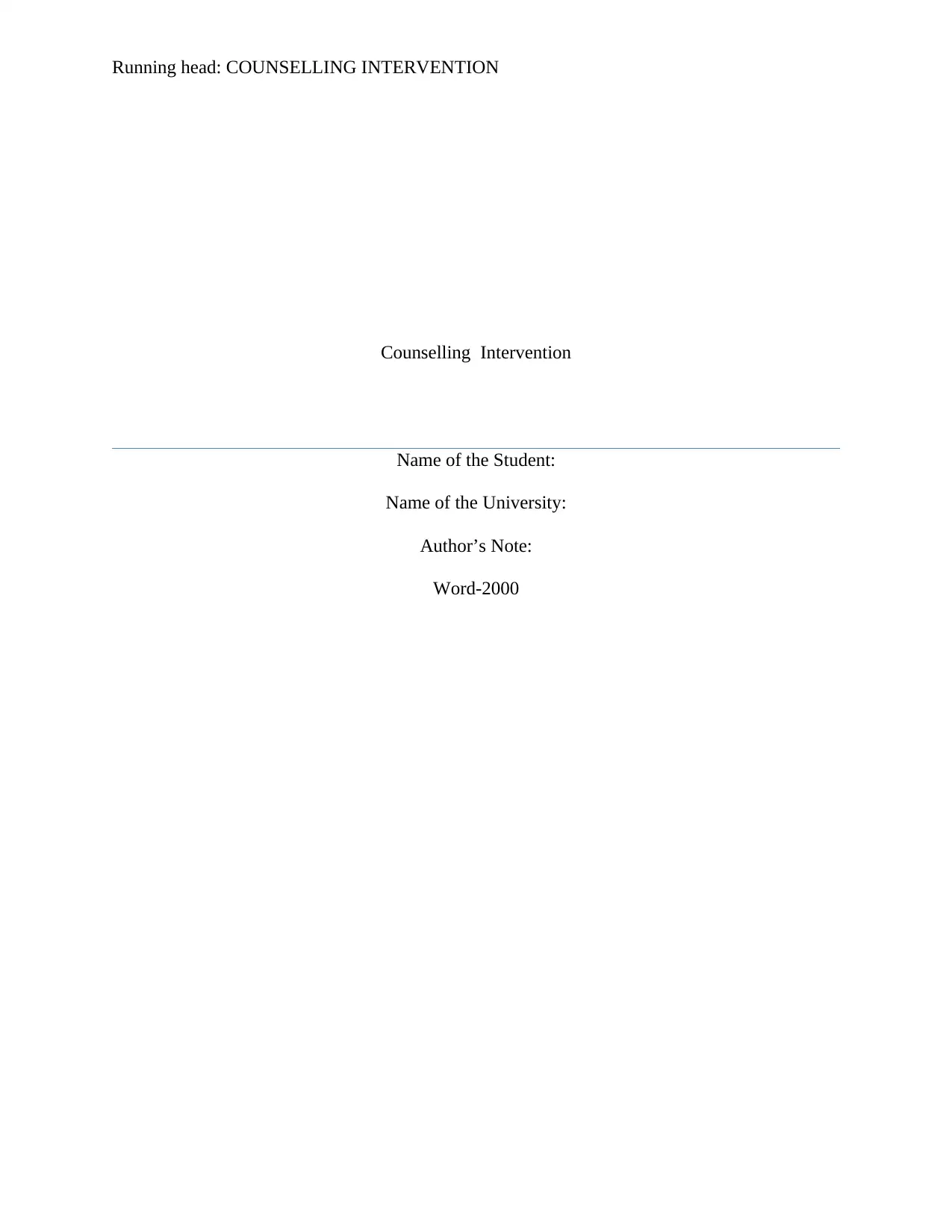
Running head: COUNSELLING INTERVENTION
Counselling Intervention
Name of the Student:
Name of the University:
Author’s Note:
Word-2000
Counselling Intervention
Name of the Student:
Name of the University:
Author’s Note:
Word-2000
Secure Best Marks with AI Grader
Need help grading? Try our AI Grader for instant feedback on your assignments.
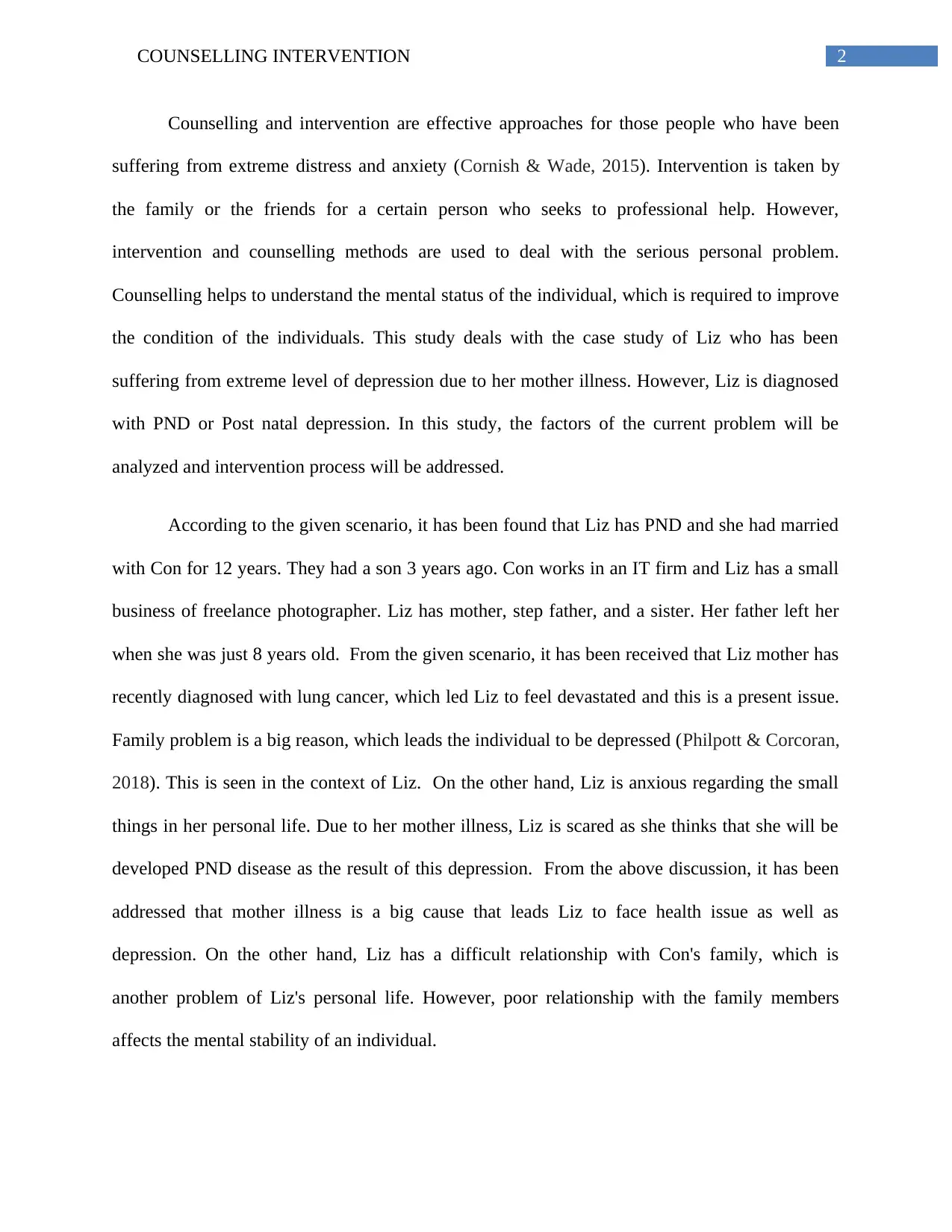
2COUNSELLING INTERVENTION
Counselling and intervention are effective approaches for those people who have been
suffering from extreme distress and anxiety (Cornish & Wade, 2015). Intervention is taken by
the family or the friends for a certain person who seeks to professional help. However,
intervention and counselling methods are used to deal with the serious personal problem.
Counselling helps to understand the mental status of the individual, which is required to improve
the condition of the individuals. This study deals with the case study of Liz who has been
suffering from extreme level of depression due to her mother illness. However, Liz is diagnosed
with PND or Post natal depression. In this study, the factors of the current problem will be
analyzed and intervention process will be addressed.
According to the given scenario, it has been found that Liz has PND and she had married
with Con for 12 years. They had a son 3 years ago. Con works in an IT firm and Liz has a small
business of freelance photographer. Liz has mother, step father, and a sister. Her father left her
when she was just 8 years old. From the given scenario, it has been received that Liz mother has
recently diagnosed with lung cancer, which led Liz to feel devastated and this is a present issue.
Family problem is a big reason, which leads the individual to be depressed (Philpott & Corcoran,
2018). This is seen in the context of Liz. On the other hand, Liz is anxious regarding the small
things in her personal life. Due to her mother illness, Liz is scared as she thinks that she will be
developed PND disease as the result of this depression. From the above discussion, it has been
addressed that mother illness is a big cause that leads Liz to face health issue as well as
depression. On the other hand, Liz has a difficult relationship with Con's family, which is
another problem of Liz's personal life. However, poor relationship with the family members
affects the mental stability of an individual.
Counselling and intervention are effective approaches for those people who have been
suffering from extreme distress and anxiety (Cornish & Wade, 2015). Intervention is taken by
the family or the friends for a certain person who seeks to professional help. However,
intervention and counselling methods are used to deal with the serious personal problem.
Counselling helps to understand the mental status of the individual, which is required to improve
the condition of the individuals. This study deals with the case study of Liz who has been
suffering from extreme level of depression due to her mother illness. However, Liz is diagnosed
with PND or Post natal depression. In this study, the factors of the current problem will be
analyzed and intervention process will be addressed.
According to the given scenario, it has been found that Liz has PND and she had married
with Con for 12 years. They had a son 3 years ago. Con works in an IT firm and Liz has a small
business of freelance photographer. Liz has mother, step father, and a sister. Her father left her
when she was just 8 years old. From the given scenario, it has been received that Liz mother has
recently diagnosed with lung cancer, which led Liz to feel devastated and this is a present issue.
Family problem is a big reason, which leads the individual to be depressed (Philpott & Corcoran,
2018). This is seen in the context of Liz. On the other hand, Liz is anxious regarding the small
things in her personal life. Due to her mother illness, Liz is scared as she thinks that she will be
developed PND disease as the result of this depression. From the above discussion, it has been
addressed that mother illness is a big cause that leads Liz to face health issue as well as
depression. On the other hand, Liz has a difficult relationship with Con's family, which is
another problem of Liz's personal life. However, poor relationship with the family members
affects the mental stability of an individual.
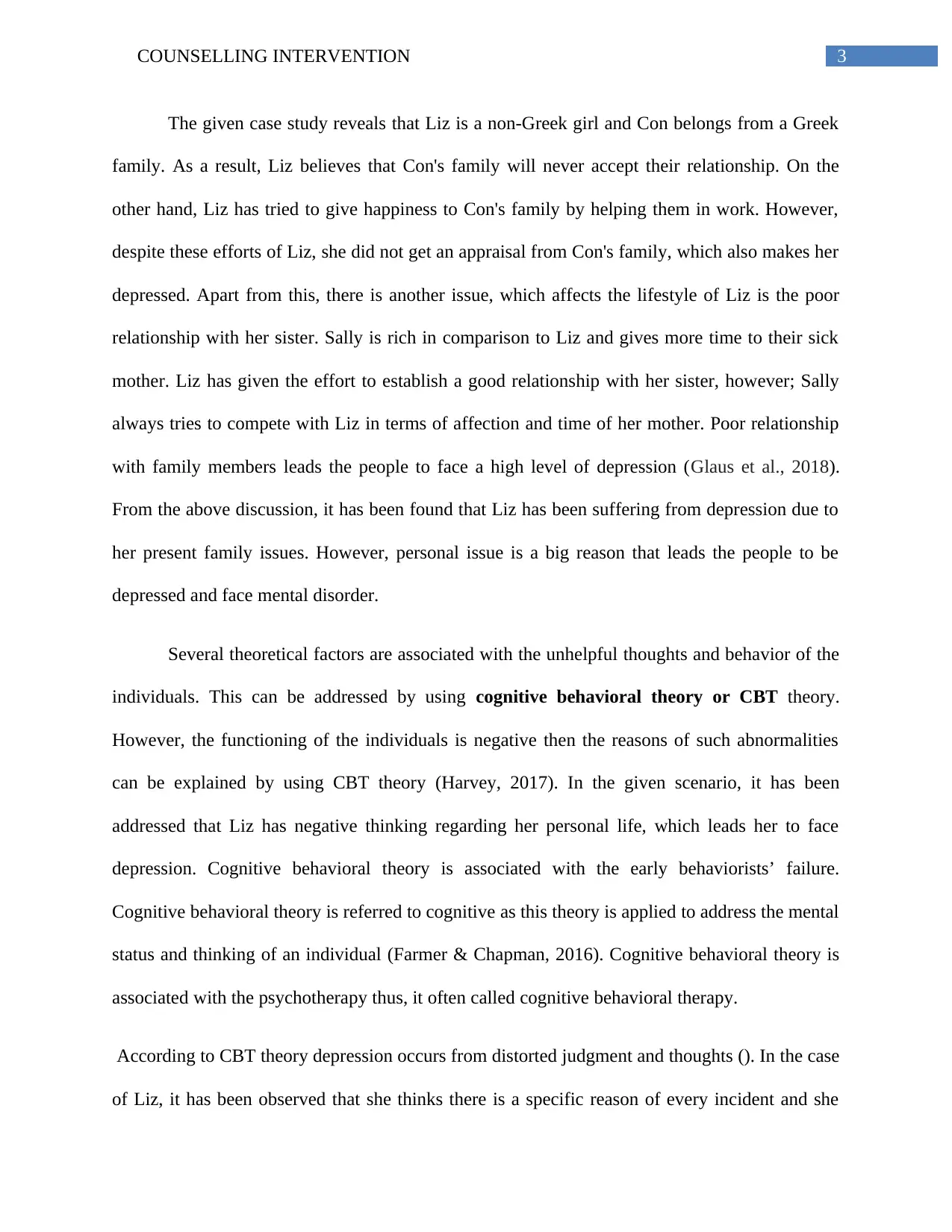
3COUNSELLING INTERVENTION
The given case study reveals that Liz is a non-Greek girl and Con belongs from a Greek
family. As a result, Liz believes that Con's family will never accept their relationship. On the
other hand, Liz has tried to give happiness to Con's family by helping them in work. However,
despite these efforts of Liz, she did not get an appraisal from Con's family, which also makes her
depressed. Apart from this, there is another issue, which affects the lifestyle of Liz is the poor
relationship with her sister. Sally is rich in comparison to Liz and gives more time to their sick
mother. Liz has given the effort to establish a good relationship with her sister, however; Sally
always tries to compete with Liz in terms of affection and time of her mother. Poor relationship
with family members leads the people to face a high level of depression (Glaus et al., 2018).
From the above discussion, it has been found that Liz has been suffering from depression due to
her present family issues. However, personal issue is a big reason that leads the people to be
depressed and face mental disorder.
Several theoretical factors are associated with the unhelpful thoughts and behavior of the
individuals. This can be addressed by using cognitive behavioral theory or CBT theory.
However, the functioning of the individuals is negative then the reasons of such abnormalities
can be explained by using CBT theory (Harvey, 2017). In the given scenario, it has been
addressed that Liz has negative thinking regarding her personal life, which leads her to face
depression. Cognitive behavioral theory is associated with the early behaviorists’ failure.
Cognitive behavioral theory is referred to cognitive as this theory is applied to address the mental
status and thinking of an individual (Farmer & Chapman, 2016). Cognitive behavioral theory is
associated with the psychotherapy thus, it often called cognitive behavioral therapy.
According to CBT theory depression occurs from distorted judgment and thoughts (). In the case
of Liz, it has been observed that she thinks there is a specific reason of every incident and she
The given case study reveals that Liz is a non-Greek girl and Con belongs from a Greek
family. As a result, Liz believes that Con's family will never accept their relationship. On the
other hand, Liz has tried to give happiness to Con's family by helping them in work. However,
despite these efforts of Liz, she did not get an appraisal from Con's family, which also makes her
depressed. Apart from this, there is another issue, which affects the lifestyle of Liz is the poor
relationship with her sister. Sally is rich in comparison to Liz and gives more time to their sick
mother. Liz has given the effort to establish a good relationship with her sister, however; Sally
always tries to compete with Liz in terms of affection and time of her mother. Poor relationship
with family members leads the people to face a high level of depression (Glaus et al., 2018).
From the above discussion, it has been found that Liz has been suffering from depression due to
her present family issues. However, personal issue is a big reason that leads the people to be
depressed and face mental disorder.
Several theoretical factors are associated with the unhelpful thoughts and behavior of the
individuals. This can be addressed by using cognitive behavioral theory or CBT theory.
However, the functioning of the individuals is negative then the reasons of such abnormalities
can be explained by using CBT theory (Harvey, 2017). In the given scenario, it has been
addressed that Liz has negative thinking regarding her personal life, which leads her to face
depression. Cognitive behavioral theory is associated with the early behaviorists’ failure.
Cognitive behavioral theory is referred to cognitive as this theory is applied to address the mental
status and thinking of an individual (Farmer & Chapman, 2016). Cognitive behavioral theory is
associated with the psychotherapy thus, it often called cognitive behavioral therapy.
According to CBT theory depression occurs from distorted judgment and thoughts (). In the case
of Liz, it has been observed that she thinks there is a specific reason of every incident and she
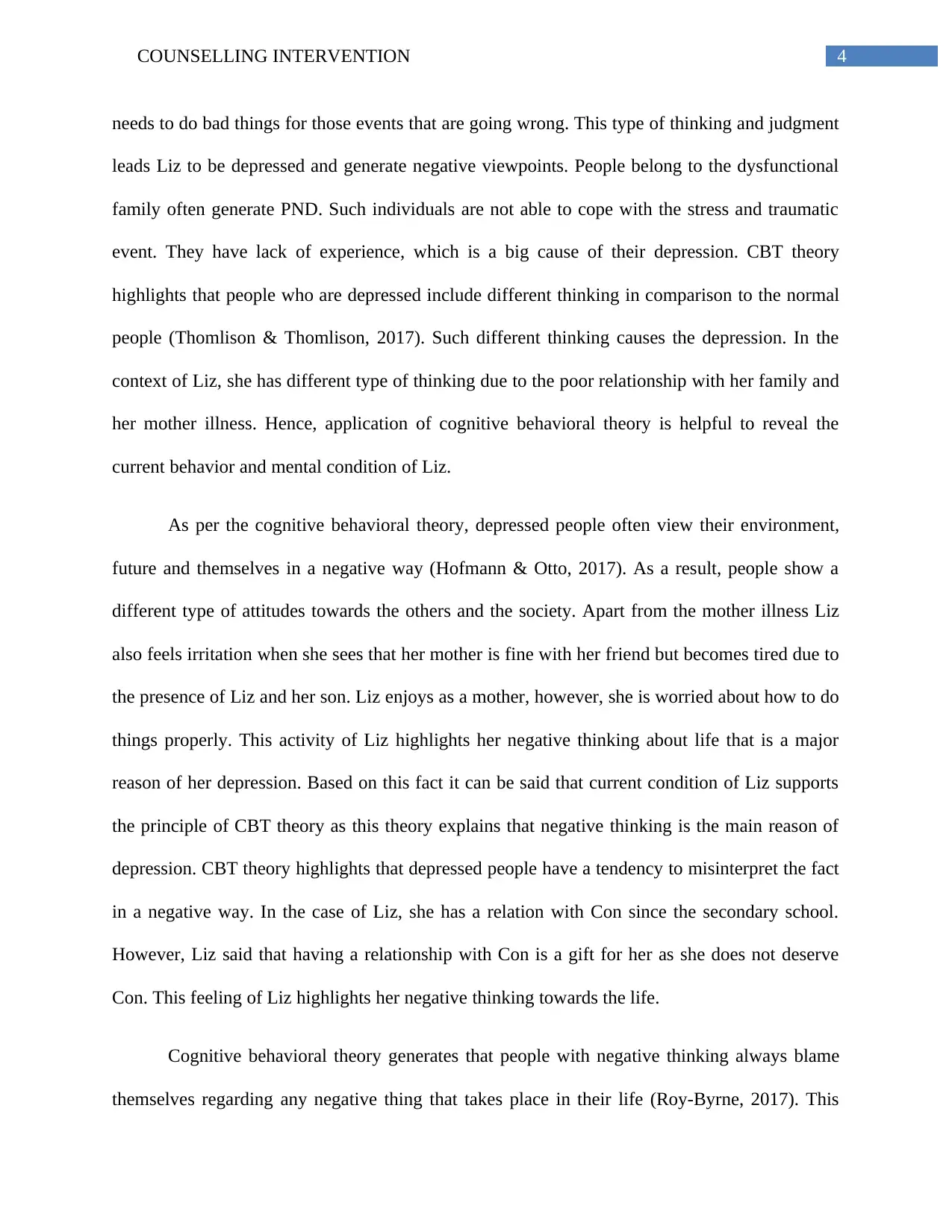
4COUNSELLING INTERVENTION
needs to do bad things for those events that are going wrong. This type of thinking and judgment
leads Liz to be depressed and generate negative viewpoints. People belong to the dysfunctional
family often generate PND. Such individuals are not able to cope with the stress and traumatic
event. They have lack of experience, which is a big cause of their depression. CBT theory
highlights that people who are depressed include different thinking in comparison to the normal
people (Thomlison & Thomlison, 2017). Such different thinking causes the depression. In the
context of Liz, she has different type of thinking due to the poor relationship with her family and
her mother illness. Hence, application of cognitive behavioral theory is helpful to reveal the
current behavior and mental condition of Liz.
As per the cognitive behavioral theory, depressed people often view their environment,
future and themselves in a negative way (Hofmann & Otto, 2017). As a result, people show a
different type of attitudes towards the others and the society. Apart from the mother illness Liz
also feels irritation when she sees that her mother is fine with her friend but becomes tired due to
the presence of Liz and her son. Liz enjoys as a mother, however, she is worried about how to do
things properly. This activity of Liz highlights her negative thinking about life that is a major
reason of her depression. Based on this fact it can be said that current condition of Liz supports
the principle of CBT theory as this theory explains that negative thinking is the main reason of
depression. CBT theory highlights that depressed people have a tendency to misinterpret the fact
in a negative way. In the case of Liz, she has a relation with Con since the secondary school.
However, Liz said that having a relationship with Con is a gift for her as she does not deserve
Con. This feeling of Liz highlights her negative thinking towards the life.
Cognitive behavioral theory generates that people with negative thinking always blame
themselves regarding any negative thing that takes place in their life (Roy-Byrne, 2017). This
needs to do bad things for those events that are going wrong. This type of thinking and judgment
leads Liz to be depressed and generate negative viewpoints. People belong to the dysfunctional
family often generate PND. Such individuals are not able to cope with the stress and traumatic
event. They have lack of experience, which is a big cause of their depression. CBT theory
highlights that people who are depressed include different thinking in comparison to the normal
people (Thomlison & Thomlison, 2017). Such different thinking causes the depression. In the
context of Liz, she has different type of thinking due to the poor relationship with her family and
her mother illness. Hence, application of cognitive behavioral theory is helpful to reveal the
current behavior and mental condition of Liz.
As per the cognitive behavioral theory, depressed people often view their environment,
future and themselves in a negative way (Hofmann & Otto, 2017). As a result, people show a
different type of attitudes towards the others and the society. Apart from the mother illness Liz
also feels irritation when she sees that her mother is fine with her friend but becomes tired due to
the presence of Liz and her son. Liz enjoys as a mother, however, she is worried about how to do
things properly. This activity of Liz highlights her negative thinking about life that is a major
reason of her depression. Based on this fact it can be said that current condition of Liz supports
the principle of CBT theory as this theory explains that negative thinking is the main reason of
depression. CBT theory highlights that depressed people have a tendency to misinterpret the fact
in a negative way. In the case of Liz, she has a relation with Con since the secondary school.
However, Liz said that having a relationship with Con is a gift for her as she does not deserve
Con. This feeling of Liz highlights her negative thinking towards the life.
Cognitive behavioral theory generates that people with negative thinking always blame
themselves regarding any negative thing that takes place in their life (Roy-Byrne, 2017). This
Secure Best Marks with AI Grader
Need help grading? Try our AI Grader for instant feedback on your assignments.
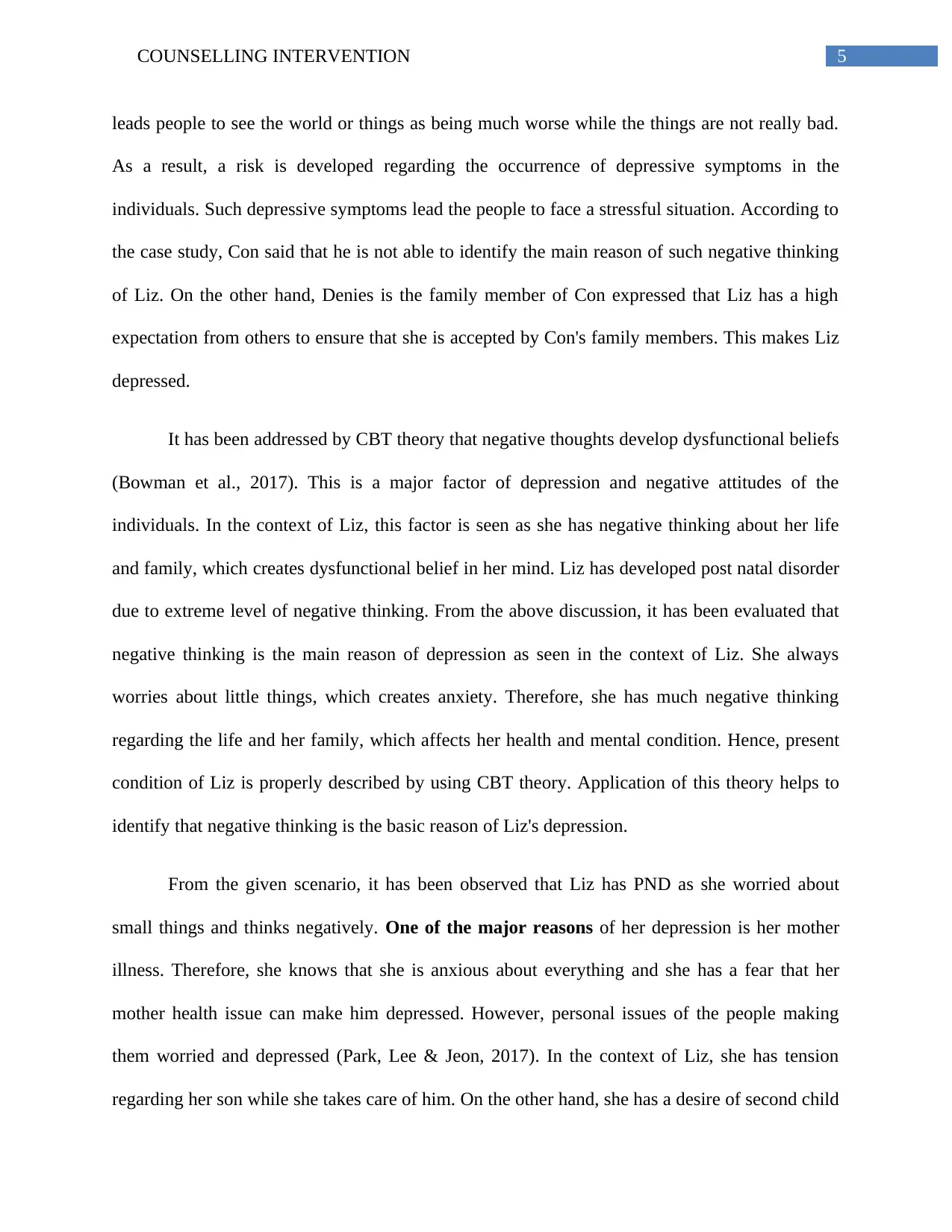
5COUNSELLING INTERVENTION
leads people to see the world or things as being much worse while the things are not really bad.
As a result, a risk is developed regarding the occurrence of depressive symptoms in the
individuals. Such depressive symptoms lead the people to face a stressful situation. According to
the case study, Con said that he is not able to identify the main reason of such negative thinking
of Liz. On the other hand, Denies is the family member of Con expressed that Liz has a high
expectation from others to ensure that she is accepted by Con's family members. This makes Liz
depressed.
It has been addressed by CBT theory that negative thoughts develop dysfunctional beliefs
(Bowman et al., 2017). This is a major factor of depression and negative attitudes of the
individuals. In the context of Liz, this factor is seen as she has negative thinking about her life
and family, which creates dysfunctional belief in her mind. Liz has developed post natal disorder
due to extreme level of negative thinking. From the above discussion, it has been evaluated that
negative thinking is the main reason of depression as seen in the context of Liz. She always
worries about little things, which creates anxiety. Therefore, she has much negative thinking
regarding the life and her family, which affects her health and mental condition. Hence, present
condition of Liz is properly described by using CBT theory. Application of this theory helps to
identify that negative thinking is the basic reason of Liz's depression.
From the given scenario, it has been observed that Liz has PND as she worried about
small things and thinks negatively. One of the major reasons of her depression is her mother
illness. Therefore, she knows that she is anxious about everything and she has a fear that her
mother health issue can make him depressed. However, personal issues of the people making
them worried and depressed (Park, Lee & Jeon, 2017). In the context of Liz, she has tension
regarding her son while she takes care of him. On the other hand, she has a desire of second child
leads people to see the world or things as being much worse while the things are not really bad.
As a result, a risk is developed regarding the occurrence of depressive symptoms in the
individuals. Such depressive symptoms lead the people to face a stressful situation. According to
the case study, Con said that he is not able to identify the main reason of such negative thinking
of Liz. On the other hand, Denies is the family member of Con expressed that Liz has a high
expectation from others to ensure that she is accepted by Con's family members. This makes Liz
depressed.
It has been addressed by CBT theory that negative thoughts develop dysfunctional beliefs
(Bowman et al., 2017). This is a major factor of depression and negative attitudes of the
individuals. In the context of Liz, this factor is seen as she has negative thinking about her life
and family, which creates dysfunctional belief in her mind. Liz has developed post natal disorder
due to extreme level of negative thinking. From the above discussion, it has been evaluated that
negative thinking is the main reason of depression as seen in the context of Liz. She always
worries about little things, which creates anxiety. Therefore, she has much negative thinking
regarding the life and her family, which affects her health and mental condition. Hence, present
condition of Liz is properly described by using CBT theory. Application of this theory helps to
identify that negative thinking is the basic reason of Liz's depression.
From the given scenario, it has been observed that Liz has PND as she worried about
small things and thinks negatively. One of the major reasons of her depression is her mother
illness. Therefore, she knows that she is anxious about everything and she has a fear that her
mother health issue can make him depressed. However, personal issues of the people making
them worried and depressed (Park, Lee & Jeon, 2017). In the context of Liz, she has tension
regarding her son while she takes care of him. On the other hand, she has a desire of second child
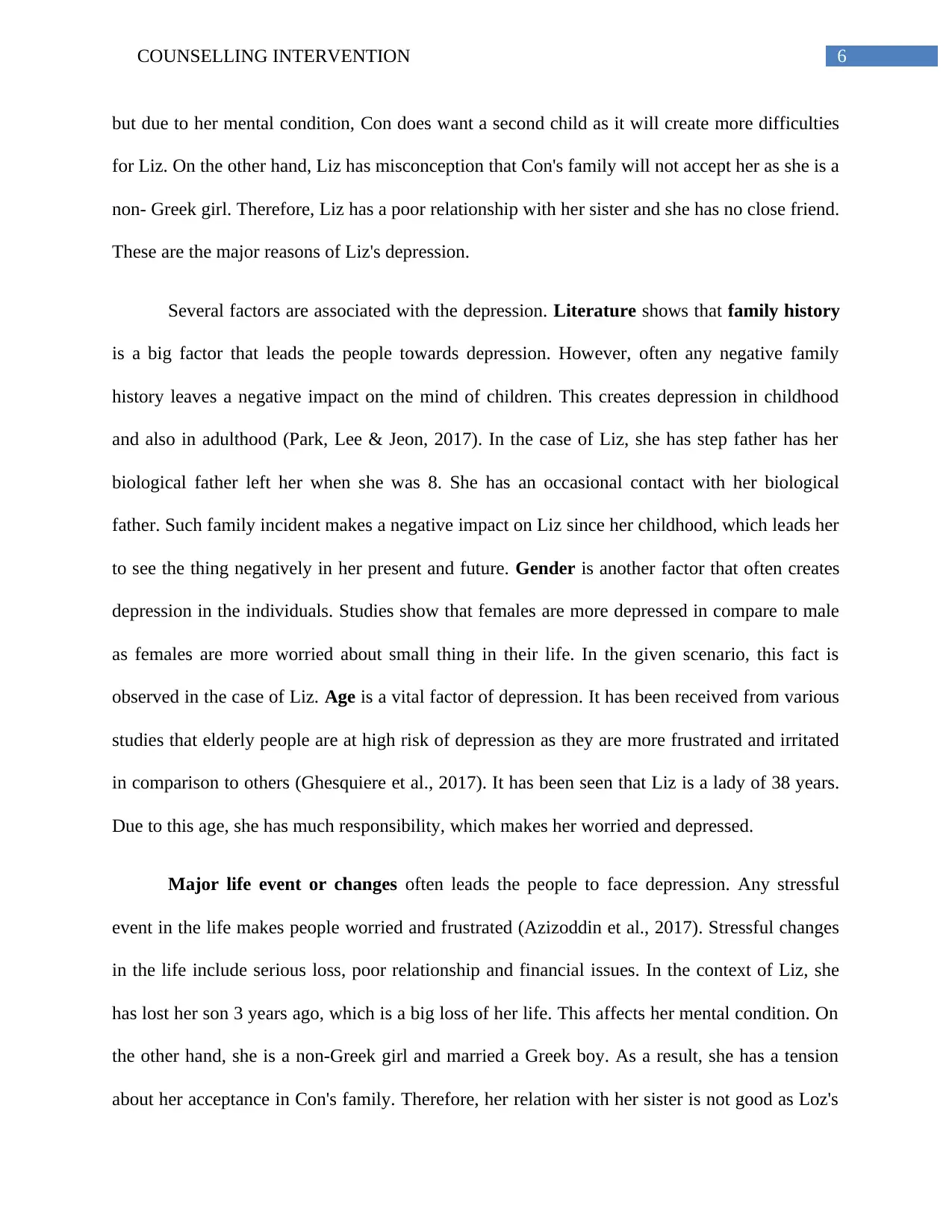
6COUNSELLING INTERVENTION
but due to her mental condition, Con does want a second child as it will create more difficulties
for Liz. On the other hand, Liz has misconception that Con's family will not accept her as she is a
non- Greek girl. Therefore, Liz has a poor relationship with her sister and she has no close friend.
These are the major reasons of Liz's depression.
Several factors are associated with the depression. Literature shows that family history
is a big factor that leads the people towards depression. However, often any negative family
history leaves a negative impact on the mind of children. This creates depression in childhood
and also in adulthood (Park, Lee & Jeon, 2017). In the case of Liz, she has step father has her
biological father left her when she was 8. She has an occasional contact with her biological
father. Such family incident makes a negative impact on Liz since her childhood, which leads her
to see the thing negatively in her present and future. Gender is another factor that often creates
depression in the individuals. Studies show that females are more depressed in compare to male
as females are more worried about small thing in their life. In the given scenario, this fact is
observed in the case of Liz. Age is a vital factor of depression. It has been received from various
studies that elderly people are at high risk of depression as they are more frustrated and irritated
in comparison to others (Ghesquiere et al., 2017). It has been seen that Liz is a lady of 38 years.
Due to this age, she has much responsibility, which makes her worried and depressed.
Major life event or changes often leads the people to face depression. Any stressful
event in the life makes people worried and frustrated (Azizoddin et al., 2017). Stressful changes
in the life include serious loss, poor relationship and financial issues. In the context of Liz, she
has lost her son 3 years ago, which is a big loss of her life. This affects her mental condition. On
the other hand, she is a non-Greek girl and married a Greek boy. As a result, she has a tension
about her acceptance in Con's family. Therefore, her relation with her sister is not good as Loz's
but due to her mental condition, Con does want a second child as it will create more difficulties
for Liz. On the other hand, Liz has misconception that Con's family will not accept her as she is a
non- Greek girl. Therefore, Liz has a poor relationship with her sister and she has no close friend.
These are the major reasons of Liz's depression.
Several factors are associated with the depression. Literature shows that family history
is a big factor that leads the people towards depression. However, often any negative family
history leaves a negative impact on the mind of children. This creates depression in childhood
and also in adulthood (Park, Lee & Jeon, 2017). In the case of Liz, she has step father has her
biological father left her when she was 8. She has an occasional contact with her biological
father. Such family incident makes a negative impact on Liz since her childhood, which leads her
to see the thing negatively in her present and future. Gender is another factor that often creates
depression in the individuals. Studies show that females are more depressed in compare to male
as females are more worried about small thing in their life. In the given scenario, this fact is
observed in the case of Liz. Age is a vital factor of depression. It has been received from various
studies that elderly people are at high risk of depression as they are more frustrated and irritated
in comparison to others (Ghesquiere et al., 2017). It has been seen that Liz is a lady of 38 years.
Due to this age, she has much responsibility, which makes her worried and depressed.
Major life event or changes often leads the people to face depression. Any stressful
event in the life makes people worried and frustrated (Azizoddin et al., 2017). Stressful changes
in the life include serious loss, poor relationship and financial issues. In the context of Liz, she
has lost her son 3 years ago, which is a big loss of her life. This affects her mental condition. On
the other hand, she is a non-Greek girl and married a Greek boy. As a result, she has a tension
about her acceptance in Con's family. Therefore, her relation with her sister is not good as Loz's
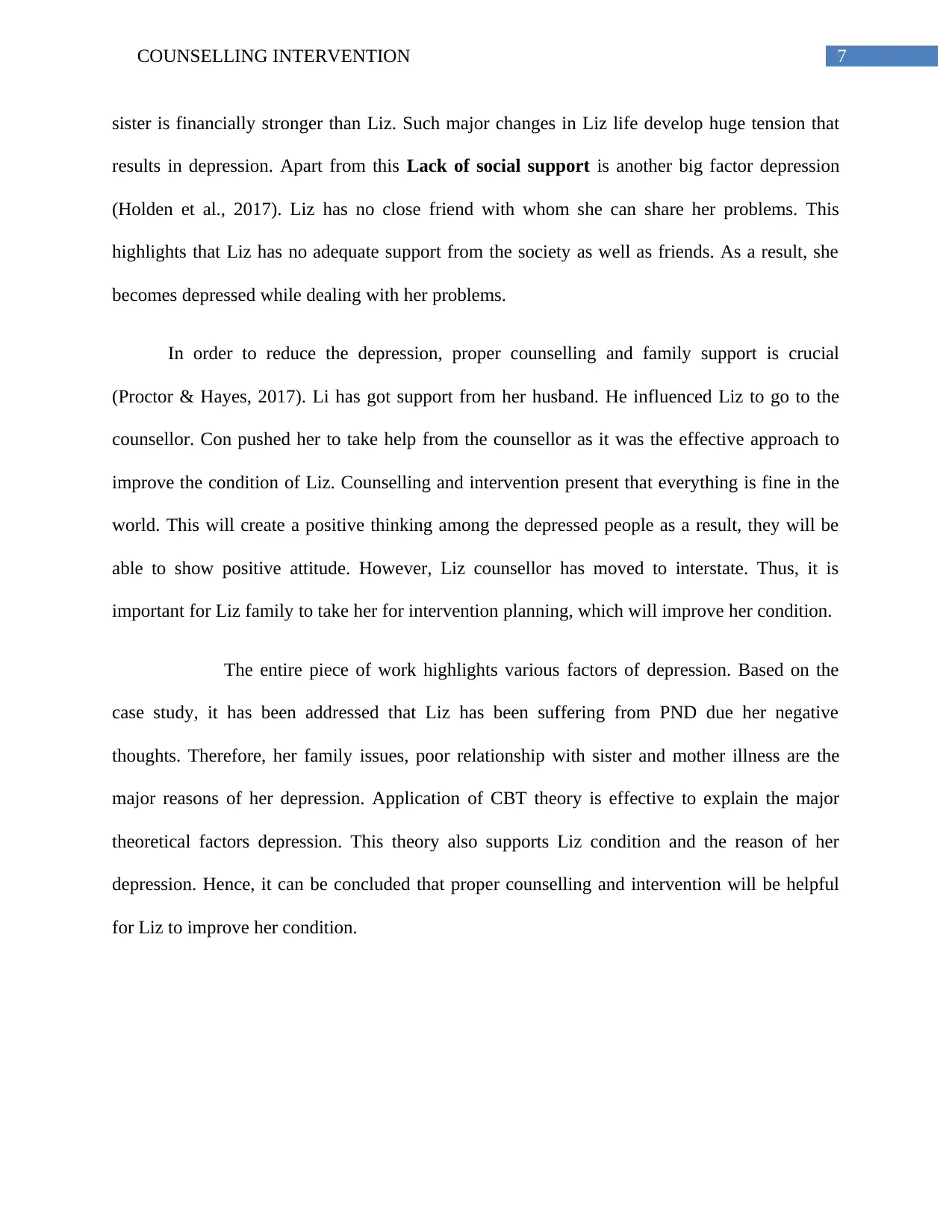
7COUNSELLING INTERVENTION
sister is financially stronger than Liz. Such major changes in Liz life develop huge tension that
results in depression. Apart from this Lack of social support is another big factor depression
(Holden et al., 2017). Liz has no close friend with whom she can share her problems. This
highlights that Liz has no adequate support from the society as well as friends. As a result, she
becomes depressed while dealing with her problems.
In order to reduce the depression, proper counselling and family support is crucial
(Proctor & Hayes, 2017). Li has got support from her husband. He influenced Liz to go to the
counsellor. Con pushed her to take help from the counsellor as it was the effective approach to
improve the condition of Liz. Counselling and intervention present that everything is fine in the
world. This will create a positive thinking among the depressed people as a result, they will be
able to show positive attitude. However, Liz counsellor has moved to interstate. Thus, it is
important for Liz family to take her for intervention planning, which will improve her condition.
The entire piece of work highlights various factors of depression. Based on the
case study, it has been addressed that Liz has been suffering from PND due her negative
thoughts. Therefore, her family issues, poor relationship with sister and mother illness are the
major reasons of her depression. Application of CBT theory is effective to explain the major
theoretical factors depression. This theory also supports Liz condition and the reason of her
depression. Hence, it can be concluded that proper counselling and intervention will be helpful
for Liz to improve her condition.
sister is financially stronger than Liz. Such major changes in Liz life develop huge tension that
results in depression. Apart from this Lack of social support is another big factor depression
(Holden et al., 2017). Liz has no close friend with whom she can share her problems. This
highlights that Liz has no adequate support from the society as well as friends. As a result, she
becomes depressed while dealing with her problems.
In order to reduce the depression, proper counselling and family support is crucial
(Proctor & Hayes, 2017). Li has got support from her husband. He influenced Liz to go to the
counsellor. Con pushed her to take help from the counsellor as it was the effective approach to
improve the condition of Liz. Counselling and intervention present that everything is fine in the
world. This will create a positive thinking among the depressed people as a result, they will be
able to show positive attitude. However, Liz counsellor has moved to interstate. Thus, it is
important for Liz family to take her for intervention planning, which will improve her condition.
The entire piece of work highlights various factors of depression. Based on the
case study, it has been addressed that Liz has been suffering from PND due her negative
thoughts. Therefore, her family issues, poor relationship with sister and mother illness are the
major reasons of her depression. Application of CBT theory is effective to explain the major
theoretical factors depression. This theory also supports Liz condition and the reason of her
depression. Hence, it can be concluded that proper counselling and intervention will be helpful
for Liz to improve her condition.
Paraphrase This Document
Need a fresh take? Get an instant paraphrase of this document with our AI Paraphraser
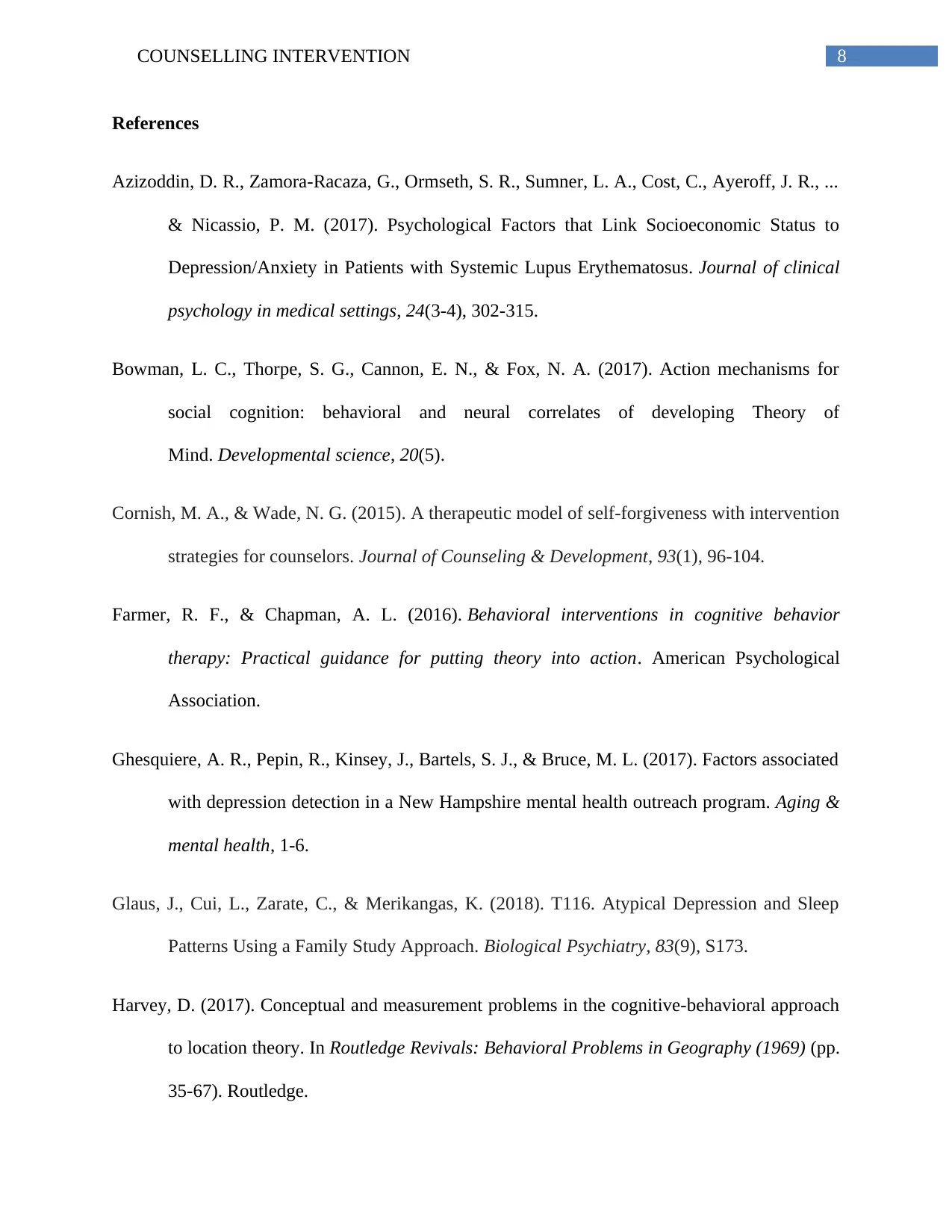
8COUNSELLING INTERVENTION
References
Azizoddin, D. R., Zamora-Racaza, G., Ormseth, S. R., Sumner, L. A., Cost, C., Ayeroff, J. R., ...
& Nicassio, P. M. (2017). Psychological Factors that Link Socioeconomic Status to
Depression/Anxiety in Patients with Systemic Lupus Erythematosus. Journal of clinical
psychology in medical settings, 24(3-4), 302-315.
Bowman, L. C., Thorpe, S. G., Cannon, E. N., & Fox, N. A. (2017). Action mechanisms for
social cognition: behavioral and neural correlates of developing Theory of
Mind. Developmental science, 20(5).
Cornish, M. A., & Wade, N. G. (2015). A therapeutic model of self‐forgiveness with intervention
strategies for counselors. Journal of Counseling & Development, 93(1), 96-104.
Farmer, R. F., & Chapman, A. L. (2016). Behavioral interventions in cognitive behavior
therapy: Practical guidance for putting theory into action. American Psychological
Association.
Ghesquiere, A. R., Pepin, R., Kinsey, J., Bartels, S. J., & Bruce, M. L. (2017). Factors associated
with depression detection in a New Hampshire mental health outreach program. Aging &
mental health, 1-6.
Glaus, J., Cui, L., Zarate, C., & Merikangas, K. (2018). T116. Atypical Depression and Sleep
Patterns Using a Family Study Approach. Biological Psychiatry, 83(9), S173.
Harvey, D. (2017). Conceptual and measurement problems in the cognitive-behavioral approach
to location theory. In Routledge Revivals: Behavioral Problems in Geography (1969) (pp.
35-67). Routledge.
References
Azizoddin, D. R., Zamora-Racaza, G., Ormseth, S. R., Sumner, L. A., Cost, C., Ayeroff, J. R., ...
& Nicassio, P. M. (2017). Psychological Factors that Link Socioeconomic Status to
Depression/Anxiety in Patients with Systemic Lupus Erythematosus. Journal of clinical
psychology in medical settings, 24(3-4), 302-315.
Bowman, L. C., Thorpe, S. G., Cannon, E. N., & Fox, N. A. (2017). Action mechanisms for
social cognition: behavioral and neural correlates of developing Theory of
Mind. Developmental science, 20(5).
Cornish, M. A., & Wade, N. G. (2015). A therapeutic model of self‐forgiveness with intervention
strategies for counselors. Journal of Counseling & Development, 93(1), 96-104.
Farmer, R. F., & Chapman, A. L. (2016). Behavioral interventions in cognitive behavior
therapy: Practical guidance for putting theory into action. American Psychological
Association.
Ghesquiere, A. R., Pepin, R., Kinsey, J., Bartels, S. J., & Bruce, M. L. (2017). Factors associated
with depression detection in a New Hampshire mental health outreach program. Aging &
mental health, 1-6.
Glaus, J., Cui, L., Zarate, C., & Merikangas, K. (2018). T116. Atypical Depression and Sleep
Patterns Using a Family Study Approach. Biological Psychiatry, 83(9), S173.
Harvey, D. (2017). Conceptual and measurement problems in the cognitive-behavioral approach
to location theory. In Routledge Revivals: Behavioral Problems in Geography (1969) (pp.
35-67). Routledge.
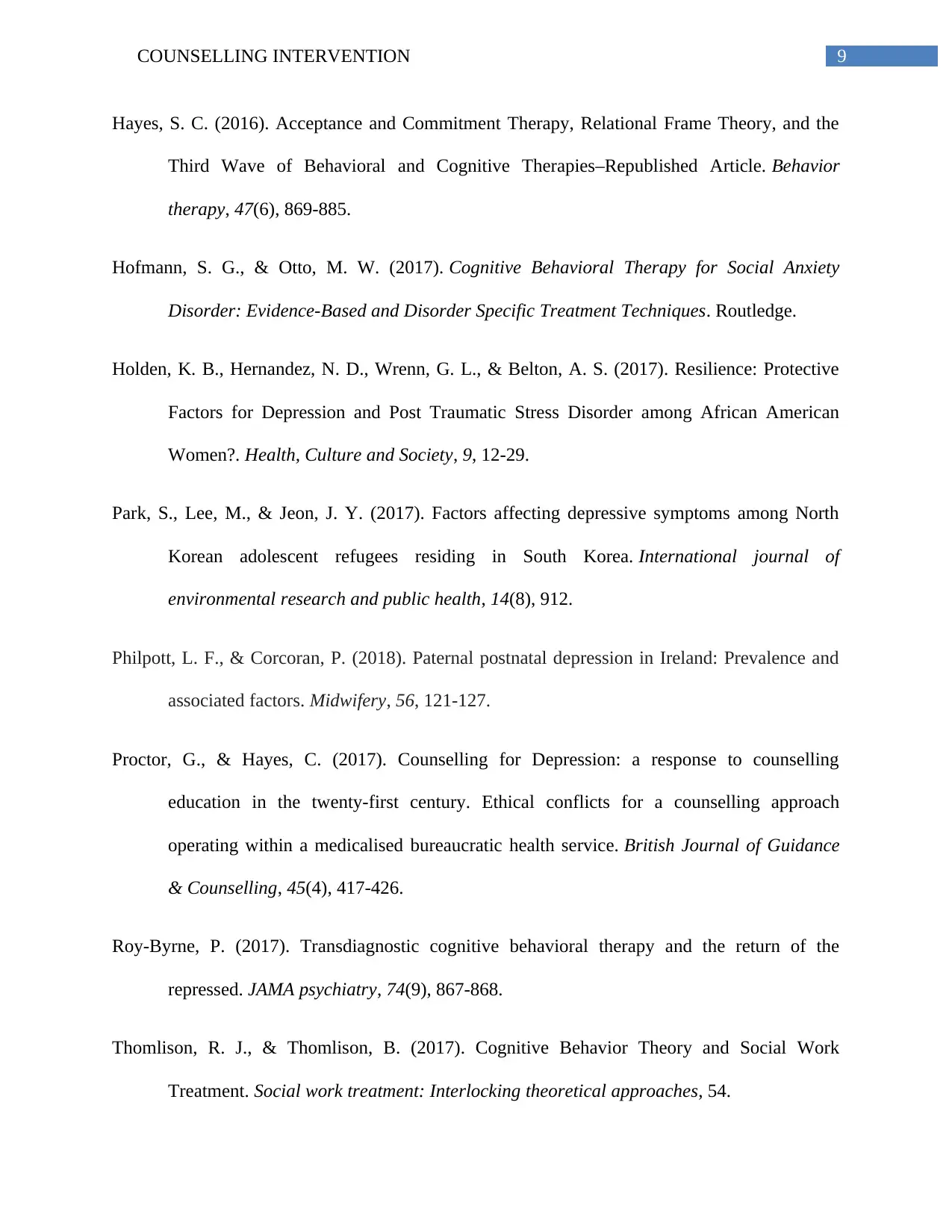
9COUNSELLING INTERVENTION
Hayes, S. C. (2016). Acceptance and Commitment Therapy, Relational Frame Theory, and the
Third Wave of Behavioral and Cognitive Therapies–Republished Article. Behavior
therapy, 47(6), 869-885.
Hofmann, S. G., & Otto, M. W. (2017). Cognitive Behavioral Therapy for Social Anxiety
Disorder: Evidence-Based and Disorder Specific Treatment Techniques. Routledge.
Holden, K. B., Hernandez, N. D., Wrenn, G. L., & Belton, A. S. (2017). Resilience: Protective
Factors for Depression and Post Traumatic Stress Disorder among African American
Women?. Health, Culture and Society, 9, 12-29.
Park, S., Lee, M., & Jeon, J. Y. (2017). Factors affecting depressive symptoms among North
Korean adolescent refugees residing in South Korea. International journal of
environmental research and public health, 14(8), 912.
Philpott, L. F., & Corcoran, P. (2018). Paternal postnatal depression in Ireland: Prevalence and
associated factors. Midwifery, 56, 121-127.
Proctor, G., & Hayes, C. (2017). Counselling for Depression: a response to counselling
education in the twenty-first century. Ethical conflicts for a counselling approach
operating within a medicalised bureaucratic health service. British Journal of Guidance
& Counselling, 45(4), 417-426.
Roy-Byrne, P. (2017). Transdiagnostic cognitive behavioral therapy and the return of the
repressed. JAMA psychiatry, 74(9), 867-868.
Thomlison, R. J., & Thomlison, B. (2017). Cognitive Behavior Theory and Social Work
Treatment. Social work treatment: Interlocking theoretical approaches, 54.
Hayes, S. C. (2016). Acceptance and Commitment Therapy, Relational Frame Theory, and the
Third Wave of Behavioral and Cognitive Therapies–Republished Article. Behavior
therapy, 47(6), 869-885.
Hofmann, S. G., & Otto, M. W. (2017). Cognitive Behavioral Therapy for Social Anxiety
Disorder: Evidence-Based and Disorder Specific Treatment Techniques. Routledge.
Holden, K. B., Hernandez, N. D., Wrenn, G. L., & Belton, A. S. (2017). Resilience: Protective
Factors for Depression and Post Traumatic Stress Disorder among African American
Women?. Health, Culture and Society, 9, 12-29.
Park, S., Lee, M., & Jeon, J. Y. (2017). Factors affecting depressive symptoms among North
Korean adolescent refugees residing in South Korea. International journal of
environmental research and public health, 14(8), 912.
Philpott, L. F., & Corcoran, P. (2018). Paternal postnatal depression in Ireland: Prevalence and
associated factors. Midwifery, 56, 121-127.
Proctor, G., & Hayes, C. (2017). Counselling for Depression: a response to counselling
education in the twenty-first century. Ethical conflicts for a counselling approach
operating within a medicalised bureaucratic health service. British Journal of Guidance
& Counselling, 45(4), 417-426.
Roy-Byrne, P. (2017). Transdiagnostic cognitive behavioral therapy and the return of the
repressed. JAMA psychiatry, 74(9), 867-868.
Thomlison, R. J., & Thomlison, B. (2017). Cognitive Behavior Theory and Social Work
Treatment. Social work treatment: Interlocking theoretical approaches, 54.

10COUNSELLING INTERVENTION
1 out of 10
Related Documents
Your All-in-One AI-Powered Toolkit for Academic Success.
+13062052269
info@desklib.com
Available 24*7 on WhatsApp / Email
![[object Object]](/_next/static/media/star-bottom.7253800d.svg)
Unlock your academic potential
© 2024 | Zucol Services PVT LTD | All rights reserved.





